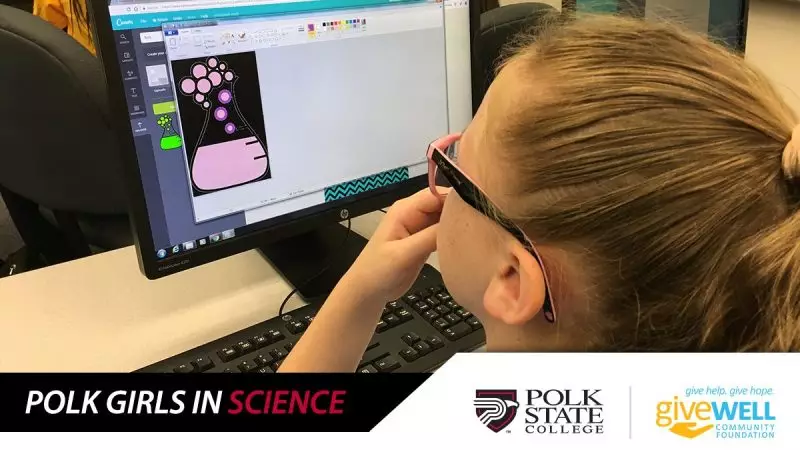Polk Girls In Science: Collaborative Effort Opens Eyes To Career Possibilities

Girls from Janie Howard Wilson Elementary and Bok Academy excitedly huddled around science lab tables at Polk State College on a recent Saturday to participate in a variety of Science, Technology, Mathematics, and Engineering (STEM) activities.
They analyzed water samples, created “trash monsters,” and spoke with women scientists from an array of backgrounds as part of Polk Girls In Science — a new program started through a grant from the GiveWell Community Foundation and a partnership with Lake Wales Charter Schools.
“The program was conceived as a means to show girls firsthand that they can be scientists,” said Professor of Earth Science Natalie Whitcomb, who spearheaded the program with Professor of Biology Logan Randolph. “Our goal is to reach them before outside influences tell them that science is not a viable career path for them.”
The girls participated in The Florida Microplastic Awareness Project over the course of many Saturdays since October under the guidance of their teachers, Lita O’Neill and Kristiana Heath from Bok Academy, and Maribel Ortega from Janie Howard Wilson Elementary; Polk State professors KT Moran, Margaret Strengel-Martinez, Amanda Jones, Joey Maier, Anthony Cornett, Dr. Randolph, and Dr. Whitcomb; and students with the Xi Pi chapter of the Phi Theta Kappa Honor Society.
“This is citizen science with a local focus,” Dr. Whitcomb said. “It’s about our lakes, which the girls have seen firsthand, and an issue that impacts our local community.”
Activities included analyzing water samples they collected from local lakes, creating posters about water quality, piecing together “trash monsters” to examine types of materials that pollute soil and water, and video chatting with women scientists from the U.S. Forest Service, NASA, Vanderbilt University, and the University of South Florida’s Department of Anthropology.
“The program has given the girls the opportunities to collect scientific data and to think like scientists,” Dr. Whitcomb said. “The program also provides the girls with mentors and role models who encourage them that they can be scientists too.”
Ortega, a science teacher and STEM coordinator at Janie Howard Wilson Elementary, said the program is a valuable experience for her students, who are mostly from minority and under-served populations.
“We want our students to know that they can have careers in STEM and that they have many avenues open to them,” Ortega said. “The opportunity for them to participate in STEM activities, as well as speak to STEM professionals and ask questions about how they got there, is incredible.”
Because of the program, fifth-grader Haleigh Tomlin wants to become a marine biologist.
“We want our students to know that they can have careers in STEM and that they have many avenues open to them,” said Maribel Ortega, a science teacher and STEM coordinator at Janie Howard Wilson Elementary.
“We have learned a lot of different things about pollution and that when you go to throw something away, you need to be aware of the different animals you can be affecting,” Haleigh said. “Through doing different experiments and learning about pollution, I realized I want to do something to protect the animals.”
Fifth-grader Taniya Cole shared a similar experience.
“I have learned that recycling is very important and that if I don’t recycle I can be harming the animals,” Taniya said.
Her favorite parts of the program have been using microscopes in Polk State’s science lab to analyze water samples they collected at Bok Academy on the school’s pontoon boat — or floating classroom — as well as video chatting with scientists and creating informational posters about what she has learned. The students’ posters will be shared in their schools, as well as with the Lake Educations/Action Drive.
Heath, who teaches eighth-grade earth/space science and environmental/marine STEM at Bok Academy, said many students don’t have the opportunity to gain the amount of STEM exposure the program has been able to provide.
“Sometimes it takes someone in their life telling them that they can do this, especially for girls in such a male-dominated field,” Heath said. “Being able to talk to STEM professionals and being immersed in STEM has opened their eyes to many possibilities.”
Eighth-grader Isabella Vega described the program as a “great hands-on experience that adds to what we learn in the classroom.”
She wants to one day be an astronomer, or maybe a geologist.
“I’ve really enjoyed learning about all of the possibilities,” Isabella said. “I like space because there are so many things out there to discover, and I also like rocks because it is fascinating that the Earth can create all of this stuff.”
Polk Girls in Science builds on efforts currently underway to create a STEM pipeline for girls and women in the community.
Polk State received $8,611 from the George W. Jenkins Fund within the GiveWell Community Foundation through the organization’s Impact Polk annual grant program. Impact Polk’s goal is to address community needs throughout Polk County.

